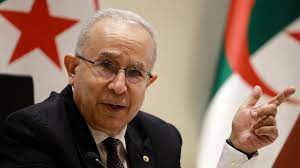Algiers has abruptly cut diplomatic relations with Rabat, coming at a time when the kingdom was poised to improve relations with its eastern neighbour.
By Hicham Alaoui
Algeria was cutting cut ties with Morocco from Tuesday because of “hostile actions” from the kingdom, the head of Algerian diplomacy, Ramtane Lamamra told a press conference during which he read a statement on behalf of the country’s president.
“History has shown that the kingdom of Morocco has never ceased to carry out hostile actions against Algeria” the minister said.
The other grievance advanced by Algiers against Rabat is the recent statements of the Israeli Minister of Foreign Affairs from Morocco.
“This is the first time since 1948 that an Israeli official has made such statements about Algeria,” the head of Algerian diplomacy said.
The statement also cited the alleged support given by Morocco to the Movement for Self-Determination of Kabylia (MAK) whose leadership lives in exile, mainly in France, and Rachad (a grouping of Algerian Islamo-conservatives based in London).
These two groups are classified as terrorist organisations by the Algerian authorities.
Ramtane Lamamra also recalled the accusations made by some Western bodies against Morocco suspected of having used Israeli spying software “Pegasus” which would have targeted several Algerian officials as well as past incidents, such as the desecration of the national flag at the consulate in Casablanca in 2013.
He also blamed “the kingdom’s leaders for the repeated crises, which have worsened,” a behaviour which, according to him, “leads to conflict instead of integration in the Maghreb region.”
“In any case, Algeria refused the feeling of the fait accompli,” Lamamra said.
“For all these reasons Algeria has decided to break its diplomatic relations with Morocco from today,” Lamamra said.
The Algerian presidency had announced on 18 August that it wanted to “review” its relations with Rabat, accusing it, this time, of being involved in the deadly fires that ravaged the north of the country and left at least 90 dead.
Lamamra’s comments also came at a time when relations between the two countries have been deteriorating in recent weeks.
A month ago, Algiers recalled its ambassador to Rabat for consultations following diplomatic tensions.
However, in a Speech on 30 July, King Mohammed VI had affirmed his “sincere commitment to keeping the hand outstretched to work together and without conditions to establish bilateral relations based on trust, dialogue and good neighbourliness”.
He had also called for the reopening of Morocco’s land borders with Algeria.
“You will never have to fear malice on the part of Morocco. The security and stability of Algeria and the peace of its people are organically linked to the security and stability of Morocco,” he said.
The king had also invited Algerian President Abdelmadjid Tebboune “to make wisdom prevail” and to “work in unison to build relations” between the two countries.
He even described the two countries as “twins that complement each other.”
The borders between Morocco and Algeria have been closed since 1994 at Algeria’s initiative.
Algiers had taken such a decision following the imposition by Rabat of an entry visa to its territory for Algerians.
At the time, Morocco suspected part of its neighbour’s security services of being behind a bloody attack that took place in Marrakech.
In 2004, visas were abolished and airlines between the two countries were re-established, but Algeria had stuck to refusal to reopen its land borders since.
Relations between the two neighbours have been particularly strained for over forty years thanks to the Sahara issue.
Algeria supports, finances and arms the Polisario Front, which claims independence for this territory.
Morocco, which does not exercise control over most of this territory and whose sovereignty over this region is recognised by most foreign governments, including the United States, is proposing autonomy under Moroccan sovereignty.
In mid-July, these relations were marked by a new wave of tension.
The Moroccan ambassador to the UN had publicly affirmed his support for the principle of “self-determination” of the Kabyle people in Algeria, in reaction to the latter’s support for the independence fighters of the Polisario Front.
Algiers responded by recalling its ambassador to Rabat for consultations.
HA/los/lb/as/APA


